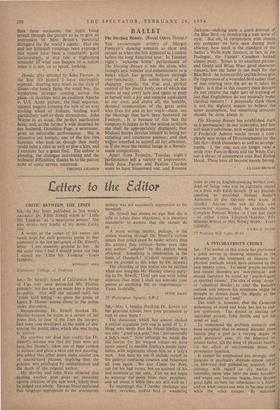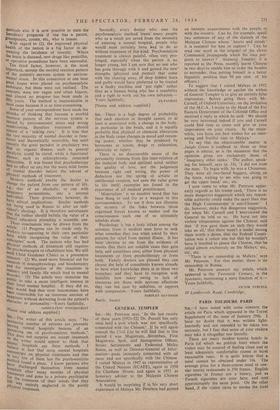A PSYCHIATRIST'S CHOICE
SIR,---The author of this article has yerfermed a great service in drawing attention to the advances in the treatment of insanity by physical methods which have occurred in the past twenty years. To many people nervous and mental disorders are ' non-physical' and should therefore be cured by 'psychological or spiritual means.' The idea of using drugs or electrical shocks' to alter the patient's outlook and remove his symptoms might be thought to detract from the dignity of the human character or ` soul.'
methods also it is now possible to state the hereditary prognosis if one -has a parent, grandparent, cousin, etc., who is insane. With regard to (2), the improved physical health of the nation is a big factor in de- creasing the incidence of insanity. Where the brain is diseased, new drugs like penicillin, or operative procedures have been successful. The third factor, however, is the most "toPortant, namely the morbid reaction pattern of the patient's nervous system to environ- mental stress. In this connection at one time great hopes were placed on psychoanalytic technique, but these were not realised. The concepts were too vague and often bizarre, and almost no progress has been made in fifty years. The method is impracticable in most cases because it is so time-consuming.
Some of your correspondents have made the mistake of thinking that because a morbid reaction pattern of the nervous system is caused by environmental stress and wrong conditioning, therefore treatment should consist of a talking cure. It is true that the vast majority of mental disorder is func- tional and theoretically reversible, but until that the great paradox in psychiatry was mat an organic disease, such as general Paralysis, could be cured, while a functional disease, such as schizophrenia, remained intractable. It was found that psychotherapy had no effect on any but the more mild forms of mental disorder before the advent of PhYsical methods of treatment.
, Modern methods" ,enable the doctor to change the patient from one pattern of life, that of an alcoholic, or one with
aginary persecutions, into a normal Individual. 'These procedures, however, do have ethical implications. Similar methods are being used in Russia to alter an indi- vidual's ideology. It is therefore unfortunate that the author should belittle the value of a Liberal education preceding a scientific one. Three conclusions may be drawn from the article. (1) Progress can be made only by Workers co-operating in their own particular field, while recognising the value of their colleagues' work. The patient who has had In'sical methods of treatment still requires need PSYchotherapist to rehabilitate him. We still "eed Child Guidance Clinics as a preventive Measure, (2) We _need more financial aid for research in neurophysiology and biochemistry • nd for investigation of the situations in I.n.dustr and family life which lead to mental alsorder. (3) The article may stimulate the Public to take a more intelligent interest in
their local mental hospital. If they did so, the
Y would find that even leucotomies have been responsible for an immense amount of C,713Ploess without detracting from the patient's naracter or personality.—Yours faithfully,
CONSULTANT PSYCHIATRIST



































 Previous page
Previous page